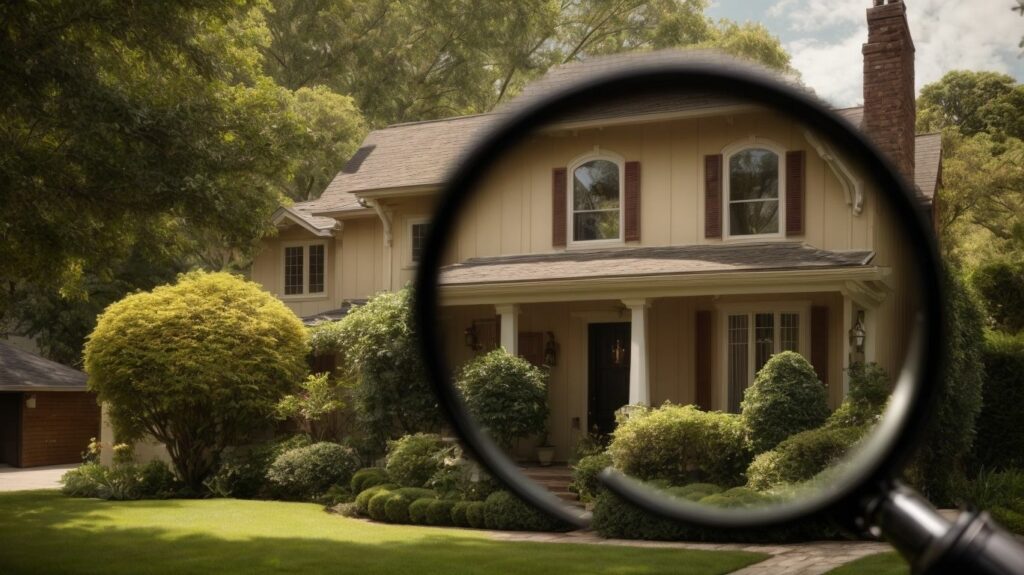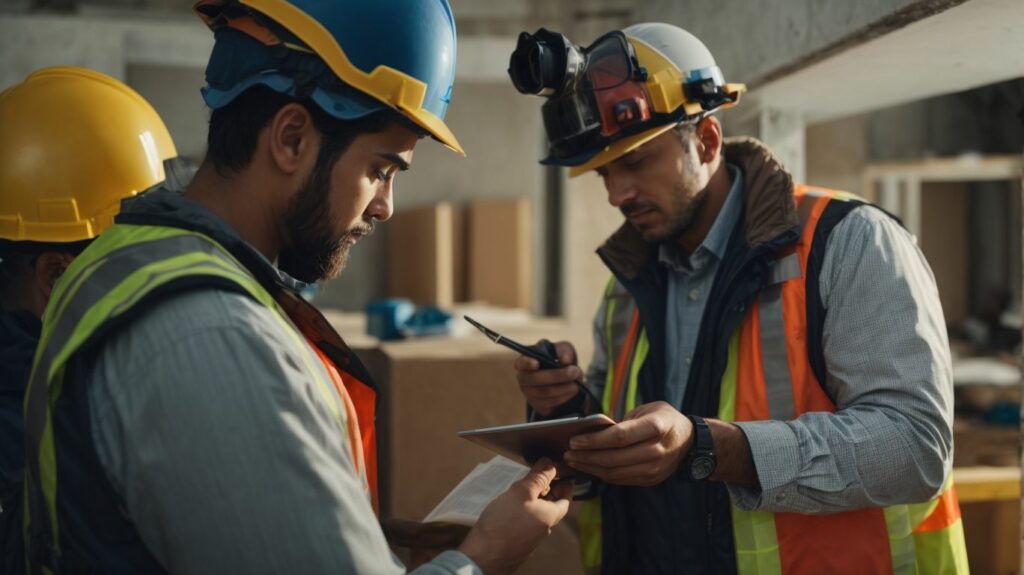20+ Years Experience
Specialist Property Inspections

Enquire Today For A Free No Obligation Quote
The Role of Property Inspections in Compliance with UK Building Regulations
Understanding UK Building Regulations
In the United Kingdom, building regulations play a crucial role in ensuring the safety and quality of construction projects. These regulations set standards for various aspects of building design and construction, including structural integrity, fire safety, energy efficiency, and accessibility. Compliance with these regulations is mandatory for all building projects in the UK.
The Importance of Property Inspections
Property inspections serve as a vital tool in ensuring compliance with UK building regulations. A property inspection involves a thorough examination of a building site or property to assess its compliance with the prescribed regulations. The primary purpose of property inspections is to identify any areas of non-compliance or potential risks that may compromise the safety or quality of the structure.
Types of Property Inspections
There are different types of property inspections that take place during different stages of the construction process. These include:
What Does a Property Inspector Look For?
During a property inspection, an inspector examines various aspects of the building to ensure compliance with building regulations. They assess:
Consequences of Non-Compliance with UK Building Regulations
Non-compliance with UK building regulations can have severe consequences. It may lead to legal penalties, project delays, costly rework, compromise the safety and well-being of occupants, and damage the reputation of the involved parties.
Avoiding Non-Compliance
To avoid non-compliance with building regulations, it is essential to select a qualified property inspector who possesses the necessary knowledge and expertise to assess compliance accurately. staying updated with regulatory changes and seeking professional advice can help ensure ongoing compliance with evolving standards.
By recognizing the role of property inspections in compliance with UK building regulations, stakeholders can prioritize the safety and quality of construction projects, fostering a built environment that meets the highest standards of safety and functionality.
Property inspections are essential for ensuring compliance with UK building regulations. They play a crucial role in verifying that construction projects meet the safety standards and regulations set by the government. Inspectors assess various aspects of the property, including its structural integrity, fire safety measures, electrical and plumbing systems, and accessibility features. Thorough inspections enable authorities to identify any potential issues and ensure that buildings are safe for occupancy. They also help prevent potential hazards and ensure that buildings meet the necessary standards for the well-being of occupants and the community.
Compliance and safety is crucial for ensuring compliance and safety in construction projects. These regulations establish the minimum standards for the design, construction, and maintenance of buildings in order to protect the health, safety, and welfare of occupants. Key areas covered by these regulations include fire safety, structural integrity, energy efficiency, and accessibility. Compliance is achieved through obtaining planning permission, securing building regulations approval, and conducting inspections throughout the construction process. A thorough understanding of these regulations enables architects, contractors, and homeowners to navigate the complexities of construction, ensure compliance, and create buildings that meet the highest standards of safety and sustainability. Additionally, it ensures that buildings are suitable for their intended purpose and meet the needs of the occupants.
UK Building Regulations are a set of standards and requirements that govern the design, construction, and alteration of buildings in the United Kingdom. They cover various aspects such as structural integrity, fire safety, energy efficiency, and accessibility. These regulations are important as they ensure the safety and well-being of occupants and promote sustainability. They outline the minimum standards that buildings must meet to comply with health, safety, and environmental standards. The regulations are regularly updated to keep pace with technological advancements and changing societal needs. Compliance with UK Building Regulations is crucial to avoid legal consequences and to create buildings that are safe, functional, and sustainable.
UK Building Regulations are of utmost importance as they play a vital role in guaranteeing the safety, accessibility, and energy efficiency of buildings. Complying with these regulations is crucial for a variety of reasons. Firstly, they safeguard the well-being and safety of occupants by establishing standards for structural integrity and fire safety. Additionally, they promote energy efficiency and sustainability, contributing to the reduction of carbon emissions and the mitigation of climate change. Lastly, they ensure that buildings are accessible to all individuals, including those with disabilities. Failure to comply with these regulations can result in severe consequences, such as penalties, legal complications, and even potential harm to human lives. Therefore, it is imperative to comprehend and adhere to UK Building Regulations in order to construct secure, sustainable, and inclusive buildings.
Property inspections are of utmost importance in ensuring compliance with UK building regulations. They serve several essential purposes. Firstly, they verify that construction meets safety standards, thus safeguarding occupants from potential hazards. Additionally, inspections ensure that buildings are structurally sound, preventing the need for costly repairs or potential collapses. Moreover, they help identify any deviations from approved plans, thereby ensuring adherence to regulations. Furthermore, inspections promote accountability and instill confidence in homeowners, tenants, and potential buyers. To illustrate the significance of property inspections, a true story exemplifies how a property inspection uncovered faulty wiring in a house, averting a potential fire hazard and ultimately saving the homeowners from a perilous situation.
A property inspection is the process of thoroughly examining a property to assess its condition and ensure compliance with UK building regulations. It is carried out by a qualified property inspector who inspects various aspects, including structural integrity, fire safety, energy efficiency, and accessibility. The purpose of property inspections in relation to UK building regulations is to guarantee that properties meet the necessary safety and quality standards. Failure to comply with these regulations can result in severe consequences. Therefore, it is essential to choose a qualified property inspector and keep up with regulatory changes to avoid any potential issues.
Property inspections are crucial in ensuring compliance with UK Building Regulations. These inspections serve the purpose of verifying that construction projects adhere to the required standards and regulations set by the government. Inspectors assess various aspects, including structural integrity, fire safety, energy efficiency, and accessibility. Their goal is to ensure that the building is safe for occupancy and meets the necessary standards. Failure to comply with these regulations can lead to serious consequences, such as legal penalties and potential safety hazards. To avoid non-compliance, it is essential to choose a qualified property inspector and stay updated with any regulatory changes.
In 2019, a building in London collapsed as a result of non-compliance with UK Building Regulations. The absence of proper inspections and failure to follow safety guidelines led to a tragic incident. This unfortunate event highlights the significance of property inspections in guaranteeing the safety and compliance of buildings.
Property inspections are crucial for ensuring compliance with UK building regulations. This section will discuss the different types of property inspections that are carried out during the construction process. These inspections include the initial inspection, progress inspections, and the final inspection. Each sub-section will explain the purpose and importance of these inspections. Let’s explore the world of property inspections and their vital role in ensuring safety and adherence to regulations.
The initial inspection is an important step in ensuring compliance with UK Building Regulations. During this inspection, a property inspector assesses the construction or renovation plans to ensure they adhere to the regulations. They check for compliance in areas such as structural integrity, fire safety, energy efficiency, and accessibility. It is important to select a qualified property inspector who has thorough knowledge of the specific requirements. Keeping up with regulatory changes is also essential to avoid non-compliance. Suggestions for a successful initial inspection include thorough planning, clear communication with the inspector, and addressing any issues promptly.
Progress inspections are an essential part of ensuring compliance with UK Building Regulations. These inspections are carried out at different stages of construction to evaluate the progress and quality of the work. Here is a breakdown of the steps involved in progress inspections:
By conducting progress inspections, regulators can guarantee that construction projects comply with UK Building Regulations and provide a safe and accessible environment for occupants.
A final inspection is an essential step in ensuring compliance with UK Building Regulations. It plays a critical role in upholding these regulations and ensuring that buildings meet the required standards for the well-being of occupants. Here is a list of steps involved in a final inspection:
Understanding the significance of the final inspection is crucial as it helps ensure that the building is safe, compliant, and ready for occupancy.
In 1874, the UK government implemented a system of building regulations to improve public safety and welfare. These regulations aimed to address issues such as overcrowding, fire hazards, and structural stability. Over the years, the regulations have evolved to incorporate advancements in technology and changing societal needs.
What Does a Property Inspector Look for?
Curious to know what a property inspector looks for? From examining the structural integrity to ensuring fire safety, energy efficiency, and accessibility, property inspections play a vital role in compliance with UK building regulations. We’ll unveil the key elements that a property inspector focuses on, shedding light on what makes a property inspection a critical step for ensuring safety and adherence to regulations. So, let’s explore what lies behind the eyes of a property inspector!
The structural integrity of a building is essential to ensure its safety, stability, and longevity. Property inspections play a vital role in assessing and maintaining the structural integrity of a property. Here is a table highlighting key aspects that property inspectors look for:
| Foundation | Inspecting for cracks, shifts, or signs of instability |
| Roof | Checking for leaks, damage, or structural issues |
| Walls | Examining for cracks, bulges, or indications of structural weakness |
| Floors | Evaluating for sagging, unevenness, or signs of compromised structural integrity |
Ensuring the structural integrity of a building is crucial in preventing accidents, minimizing maintenance costs, and safeguarding the occupants. History has shown the devastating consequences of compromised structural integrity, such as building collapses, leading to loss of lives and property. Property inspections are an essential measure to mitigate risks and maintain the safety of buildings.
Fire safety is an essential aspect of complying with UK building regulations. It involves measures to prevent, detect, and respond to fires, ensuring the safety of occupants and protecting property. The following table outlines key elements of fire safety in building inspections:
| Aspect | Description |
|---|---|
| Fire detection | Inspectors check the presence and functionality of smoke detectors, fire alarms, and sprinkler systems. |
| Fire escape routes | Evaluate the layout and accessibility of escape routes, including exits, stairways, and emergency lighting. |
| Fire-resistant materials | Assess the use of fire-resistant or non-combustible building materials to minimize fire spread. |
| Fire suppression systems | Inspect fire extinguishers, hose reels, and fire doors to ensure they are in proper working condition. |
| Emergency planning | Review the presence and adequacy of fire escape plans, evacuation procedures, and training for occupants. |
Building inspections play a crucial role in verifying that properties comply with fire safety regulations, minimizing the risk of fire-related incidents and protecting lives and property.
Energy efficiency is an important aspect of property inspections in compliance with UK Building Regulations. It ensures that buildings are designed, constructed, and renovated to be energy-efficient, thereby reducing carbon emissions and minimizing energy consumption. During property inspections, inspectors assess various factors related to energy efficiency:
By prioritising energy efficiency in property inspections, buildings can contribute to environmental sustainability and reduce energy costs for occupants.
Property inspections are an essential aspect of property inspections in accordance with UK Building Regulations. Inspections ensure that buildings are accessible to all individuals, including those with disabilities or limited mobility. Property inspectors evaluate elements such as ramps, handrails, doorway widths, and accessible parking spaces to ensure compliance with accessibility standards. The aim of addressing accessibility during inspections is to create an inclusive and secure environment for everyone. Non-compliance with accessibility regulations can lead to legal consequences. Therefore, it is crucial to hire qualified property inspectors who have a comprehensive understanding of accessibility requirements and to stay updated with any regulatory changes.
Non-compliance with UK building regulations can have serious consequences, including legal penalties and safety hazards. Here are some key repercussions of not adhering to these regulations:
To avoid these consequences, it is crucial to ensure full compliance with UK building regulations.
To avoid non-compliance with UK building regulations, it is important to consider two key factors. The first is selecting a highly qualified property inspector, which is crucial in order to prevent potential issues. The second factor is staying informed about the constant changes in regulations, as this is essential for maintaining compliance. In this section, we will explore the importance of having a reputable inspector and the significance of being aware of regulatory modifications in the context of property inspections and UK building regulations.
Selecting a qualified property inspector is essential to ensure compliance with UK building regulations. Here are some steps to consider when choosing a qualified property inspector:
Keeping up with regulatory changes is crucial when it comes to complying with UK Building Regulations. These regulations are constantly evolving to ensure the safety, accessibility, and energy efficiency of buildings. To avoid non-compliance, property owners and stakeholders must stay informed about any regulatory updates. They can do so by regularly reviewing official government publications and consulting with qualified property inspectors. By staying up to date, property owners can take timely actions to meet new requirements and avoid potential penalties. Keeping up with regulatory changes is a proactive approach that helps ensure that buildings meet the latest standards and provide a safe environment for occupants.
Property inspections play a crucial role in ensuring compliance with UK building regulations. Building control surveyors conduct inspections to verify that buildings are constructed in accordance with the standards set by building regulations. They assess various aspects of construction, including foundations, structural issues, insulation, ventilation, heating, sanitation, accessibility, and fire protection. Inspections ensure that the construction work meets the specified requirements and helps to maintain the safety and quality of buildings.
Regular property inspections carried out by building control surveyors help protect against unsafe practices and cowboy builders. Surveyors make regular site visits to ensure that the construction work is on track and complies with necessary standards. They offer advice and guidance to property owners and builders, ensuring that the work meets the required regulations. By closely monitoring the construction process, building control surveyors help prevent faulty construction and maintain the safety and integrity of buildings.
Even for minor renovations or extending existing homes, building control remains important. Building control surveyors ensure that such projects comply with the relevant building regulations. They inspect the construction work to ensure that it meets the required standards for structural integrity, insulation, ventilation, and fire protection, among other aspects. This ensures that the completed renovations or extensions are safe and meet the necessary building standards.
Yes, property inspections are vital in promoting energy efficiency and sustainable buildings. Building control surveyors ensure that the construction work follows building regulations that aim to conserve fuel and power, protect the environment, and promote sustainable development. By examining aspects such as energy performance, lighting efficiency, acoustic performance, and the use of eco-friendly features like solar panels, surveyors help ensure that buildings are energy-efficient and contribute to sustainable development.
Hiring certified professionals or competent tradespeople is essential for construction work to meet building regulations. Building control surveyors work closely with property owners, builders, and designers to ensure that construction decisions and specifications adhere to the regulations. Hiring certified professionals or competent tradespeople ensures that the construction work is done by individuals with the necessary knowledge and skills to comply with the relevant building standards, ensuring the safety and quality of the construction project.
Non-compliance with building control and regulations can have various consequences. Local authorities can enforce building regulations and may require non-compliant work to be altered or removed. Companies or individuals responsible for faulty work can be prosecuted and fined. Furthermore, failure to meet building standards can lead to legal action and additional financial penalties. Moreover, approval from building control is crucial when selling or re-mortgaging a home. A completion certificate, indicating compliance with building regulations, is necessary for solicitors, agents, mortgage lenders, and property insurers.









We Aim To Reply To All Enquiries With-in 24-Hours